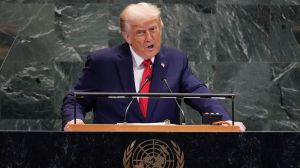ADB for regional monitoring unit
MUMBAI, Oct 28: The Asian Development Bank (ADB), in an effort to bring in regional surveillance efforts in the aftermath of the East Asi...

MUMBAI, Oct 28: The Asian Development Bank (ADB), in an effort to bring in regional surveillance efforts in the aftermath of the East Asian crisis, is planning to set up a Regional Economic Monitoring Unit to support regional and sub-regional monitoring activities.
However, to all appearances, India is nowhere in the reckoning for a membership, and may miss the bus again on participation in an Asian cooperative economic experience.
Speaking at the 17th Confederation of the Asia Pacific Chambers of Commerce & Industry (CACCI) conference on the role of regional co-operation, Pradumna Rana, senior economist with ADB, said the unit will go a long way in preparation of regional and sub regional monitoring reports that will focus on macro-economic and financial sector issues that are of common concern across the region. However, quizzed about India’s role in the proposed new mechanism, he did not have any positive responses.
The conference has been organised by the Federation of Indian Chamber of Commerce &Industry (FICCI).
In the past, India has sought and been repeatedly refused entry into Asian regional economic blocks. India has been refused membership first of Asean, and later of the Asia Pacific Economic Cooperation (APEC) mechanism.
The result is that India has found itself isolated from the business mainstream of Asia and failed to participate in any way in the mushrooming growth phase of the paper tiger economies.
The economic monitoring unit, Rana said, will assist in the formulation of policies that are relevant to the avoidance and management of economic crises, particularly as regards banking sector standards and the role and development of securities and equities markets that are needed to complement banking systems.
ADB, the senior economist said, will support the dissemination of information within the region on sound banking and financial practices through its policy papers and other methods of technical assistance.
The bank, which is in favour of structural reforms to tide over thecrisis, will also consider capacity building and training in central banks and ministries of finance in areas relevant to strengthening of the economic monitoring unit, Rana said at the conference.
While explaining why the SE Asian economic crisis is different from the Mexican one Rana elaborated that while in the case of Mexico the reversal took place within a short span, there seems no wind of reversal in sight after the SE Asian crisis.
He explained the SE Asian crisis is more protracted as compared to the Mexican one as the former is structural in nature and structural policies are difficult to design. Rana cited the root cause of the crisis in macroeconomic vulnerability coupled with exports on the downturn and poor corporate governance.
However, he added a glimmer of hope by saying:"We believe the recession would be over."
CACCI, at its meeting in Mumbai, highlighted that the recent Asian turmoil offered a number of lessons for policy makers and were unanimous that openness, and not isolation,is the way forward. For instance, lessons from China are worth learning that a stop-gap mechanism will only lead to a series of repercussions and back lashes.
The chamber asserted that priority should be given to tackling economic problems at their roots, rather than just dealing with symptoms. "Governments must implement consistent macroeconomic policies which encourage sound and durable economic growth, in conjunction with low inflation, fiscal discipline and favour external balances," CACCI has observed.
Besides, the effectiveness of the central bank supervision of financial systems and institutions, noted CACCI, needed to be improved considerably and unsound financial institutions should be closed down.
Earlier, speaking on restoring Asian dynamism in the global context, CEO of Australian Chamber of Commerce & Industries, Mark Paterson said that this can be possible by observing greater amount of corporate governance, with better economic policies, positive reforms process, better economicinfrastructure and efficient building of the human pool.
He said that government spending should be channelised more into productive activities. Tackling issues of monopolies, trade barriers and other hurdles like corruption, education, etc, is a must, Paterson observed.
Photos



- 01
- 02
- 03
- 04
- 05




























